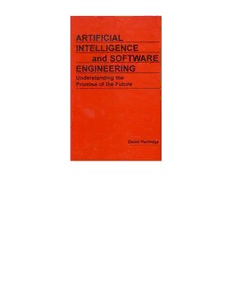
Artificial Intelligence and Software Engineering: Understanding the Promise of the Future PDF
276 Pages·1998·2.556 MB·English
Most books are stored in the elastic cloud where traffic is expensive. For this reason, we have a limit on daily download.
Preview Artificial Intelligence and Software Engineering: Understanding the Promise of the Future
Description:
After seeing the 1998 copyright date I confess I was intrigued. AI, in any form, hasn't gotten much press lately. If you're looking for an update on the state of AI since 1990, however, this isn't it. The book's materials are almost exclusively from 1991 and earlier. Only 3 references are given to sources later than 1991 and two of those sources are from the author himself. That said, the book still has some interesting things to say and some lasting value. The author's approach is unique: compare standard methods in traditional software engineering to the development approaches necessary for AI work. Partridge spends a great deal of time in the book discussing the state-of-the-art (in 1990) for software engineering while making occasional comparisons to similar strategies for successful AI application development. As Partridge puts it "in attempting to engineer AI- software we subject the standard procedures of software design and development to close scrutiny--our attempts to build robust and reliable AI-software provides a magnifying glass on the conventional procedures." The author continues this scrutiny throughout the book. One of the things that makes the book interesting is a view back at what computer science thought AI would have to solve (since traditional engineering practices would fall short). Automatic programming would be needed to help write all these new programs. Having humans do all that would introduce too many defects. Instead, we have "wizards", vast class libraries, and a much stronger set of powerful tools that significantly limit the amount of code that is written. Similarly, the need for report generators has lessened because the pervasive use of relational databases and the powerful report generation tools. My favorite was "the problem of decompiling" when discussing reverse engineering. "decompilers are somewhere between scarce and nonexistent..." Consider the modern day UML tools such as Together/J which can take a JAR file (with only code) and reverse engineer an entire UML class hierarchy! Because the book is not really updated from the early 1990's, there is no mention of genetic programming, no mention of speech software on desktops, and no machine vision advances are discussed, just to name a few shortcomings. It is an interesting trip down memory lane, and has some interesting things to say about AI and SE and may be worth reading on that front. However, if you want an overview of AI, you will need to look elsewhere.
See more
The list of books you might like
Most books are stored in the elastic cloud where traffic is expensive. For this reason, we have a limit on daily download.
